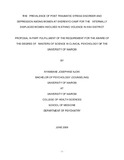| dc.contributor.author | Nyambane, Josephine N | |
| dc.date.accessioned | 2013-05-24T08:08:50Z | |
| dc.date.available | 2013-05-24T08:08:50Z | |
| dc.date.issued | 2009-06 | |
| dc.identifier.citation | Bachelor Of Psychology (counseling), University Of Nairobi,2009 | en |
| dc.identifier.uri | http://erepository.uonbi.ac.ke:8080/xmlui/handle/123456789/25200 | |
| dc.description.abstract | Background
Violence is a common feature of modern life. Media presentation is filled with images of people hurting one another and although much attention is given to scenes depicting perpetrators of violence little is given to the victim's psychological problems. Ethnic clashes have led to destruction of communities, deepening ethnic hatred, food shortages and creation of "refugee ", displacement and migration with their accompanying problems. All these have specific consequences on the lives of displaced women with some of these consequences resulting in psychological problems.
Kenya has not been spared of this unpredictable ill. Recently people of different ethnic groups turned on each other, destroying property and lives of their opponent ethnic groups. Women died, others were widowed, orphaned and most of them suffered several forms of abuse both physical and psychological (emotional) especially due to sexual abuse.
Study objectives: This study aims at identifying the presence of PTSD and
Depression among women who are victims of ethnic violence. The specific
objectives of the study is to establish the demographic profile of women
who have suffered psychologically due to ethnic violence, the presence of
PTSD ,and depression in these women and to document their subjective
experiences
Study design. This was a descriptive and quantitive study that adopted a population survey
Setting: Ekerenyo IDP Camp in Kisii District.
Subjects: Women, who consented, were above 18 years and were in the
IDP camp at the time of study or at Ngoina road area after relocation and were affected by ethnic violence after December 2007 election.
Research instrument:
1. A socio-demographic profile designed by the researcher,
2. Impact of Event Scale -Revised (for PTSD) and
3. Becky's Depression Inventory (for depression)
Result: The study shows extremely high levels of PTSD(100%) which is not surprising considering the traumatic events that occurred during the post election violence (burning of houses, murder, eviction, rape, etc) all the respondents (198) presented with PTSD with 176(89%) with moderate PTSD and 22(11%) with severe PTSD. Women with symptoms formed 94% while those with no depression were 6%. Those with moderate depression formed a bigger percentage 130 (65%) of the sample population. This was followed by 49(25%) of the women who had mild depression. Apparently only 7(4%) of
the women had severe depression while 12 (6%) women had depression.
Conclusion: The study concluded that Post Traumatic Stress Disorder and Depression is present in women who have suffered ethnic violence. | en |
| dc.language.iso | en | en |
| dc.publisher | University of Nairobi | en |
| dc.title | The prevalence of post traumatic stress disorder and depression among women at Ekerenyo camp for the internally displaced women involved in ethnic violence in Kisii District | en |
| dc.type | Thesis | en |
| dc.description.department | a
Department of Psychiatry, University of Nairobi, ; bDepartment of Mental Health, School of Medicine,
Moi University, Eldoret, Kenya | |
| local.publisher | Department Of Psychiatry | en |

